The Secret Revolution of Ouran High School Host Club
by Rose Bridges,I like Free! a lot. I started watching it between classes in the summer of 2013, and it helped me relax and adjust to the new semester. Many people who aren't part of Free!'s target audience (which is female and usually attracted to men) wonder just what made it take off as hard as it did. Personally, I think that the show is like soothing, escapist balm—even in its more dramatic moments—and it wasn't the first of its class. Other shows had to pave the way for the advent of the "fujoshi comedy," sometimes years in advance.
Free! is one of the most successful entries in this relatively new genre. "Fujoshi comedies" can be loosely defined as humorous anime with predominantly male casts that cater to shipping-obsessed fangirls. This isn't the same thing as shonen-ai, with its more explicit gay subtext and often more dramatic focus. Fujoshi comedies flirt with the idea of gayness for titillation, but they never quite go there. The current success of this new flavor of manservice owes its existence to another escapist fantasy with a slightly sharper edge: Ouran High School Host Club. Explaining Free!'s appeal means understanding Ouran's, in a way. So let's explore how Ouran evolved from an earlier genre and pioneered a new one in the process.
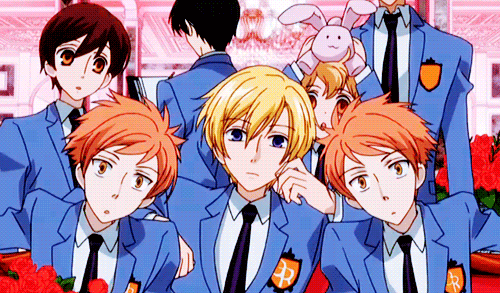
Ouran began as yet another shojo reverse harem, which are the gender-reversed equivalents to harem shows like Tenchi Muyo!, Love Hina, or Monster Musume. However, Ouran quickly set itself apart by playing around with its genre clichés in an affectionate manner and frequently breaking the 4th wall. The author has acknowledged various influences and references, such as basing her "boy Lolita type" Honey on Fruits Basket's Momiji. The basic premise of Ouran is also similar to the iconic reverse harem series Boys Over Flowers, about a headstrong poor girl at a private high school full of rich kids. The anime adaptation was largely written by Yōji Enokido, in a similar mold to his work on the deconstructive Revolutionary Girl Utena series, and he borrows a lot of its iconic visual references (like blinking arrows and spinning roses) for more farcical purposes in Ouran. So if Ouran is undeniably steeped in shojo conventions, how did it manage to popularize a totally new genre instead? The rules Ouran successfully broke and reinvented were small, but they made a big difference.
Drama is Okay, but Keep Things Lighthearted
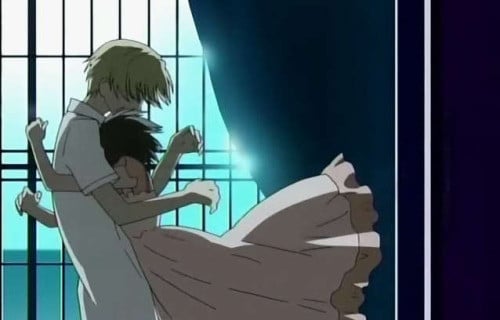
Old-school reverse harems were often fraught with problems. They had a habit of romanticizing unhealthy relationships and reinforcing stereotypical gender dynamics. The heroines are often helpless and need constant saving. Take the incredibly successful Fushigi Yuugi from 1995: Miaka is basically a plot device, completely helpless without her harem of Suzaku warriors to protect her. The show even combined threats of rape or assault with goofy 90s slapstick comedy, leading to some really jarring tonal shifts. Fujoshi comedies like Ouran largely avoid this by not letting things get that serious in the first place. Vicarious romance can be a cute, fun experience, not just a dramatic-to-the-point-of-discomfort one.
Ouran definitely has drama, but it nails its tonal shifts better than most anime comedies, regardless of genre. The guys in the Host Club have some serious family issues. Still, we never see much of it directly, as the show tends to rely on visual metaphor instead, another trick pulled from Utena. While the more dramatic episodes still feel true to life, they're mostly vehicles for warm fuzzies about the club's camaraderie and how it makes up for their dysfunctional family histories. The show even maintains its upbeat tone when it's not firing away with jokes. Fujoshi comedies still follow this mold: the boys of Free! can get pretty sad or mad sometimes, but what we see is rarely too upsetting to unseat the show's happy, bubbly feel. Their issues are limited to familiar high school drama and some non-abusive family dysfunction.
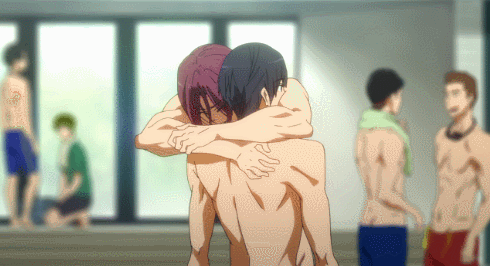
Ultimately, these shows create relatable characters and sometimes even romance between them, while still maintaining a cuddly environment. You can come home to these shows and get lost in them after a bad day without feeling overly pandered to, and that's one of the biggest keys to their popularity. Don't get me wrong: dark or trashy romance definitely has its place. Still, it's nice to have series push your emotional buttons without leaving you yearning for a shower afterward. Allowing viewers to fangirl without guilt felt fresh in 2006, and now it's closer to the status quo.
Girls Do Like Nice Guys
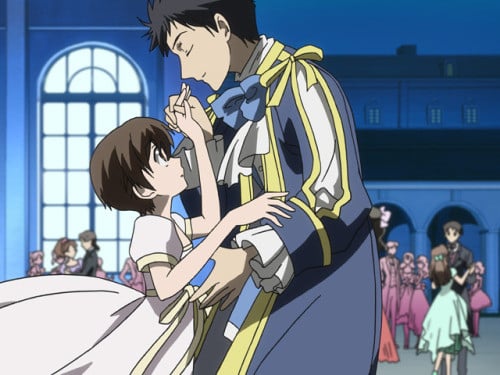
The guys of Ouran are pretty nice people. They could be as snooty and dismissive of Haruhi's commoner ways as we'd expect from the ultra-rich, but instead they're curious (and enthusiastic in Tamaki's case) to learn about how she's different from them. They're cheerful and good-natured about all the crazy antics around them. The meanest characters in the show—the twins—are never actually threatening, and their selfishness is rooted in sympathetic characterization. There's still the Host Club's grumpy "mom" Kyoya, who has an infamous scene that comes closest to "bad boy" shojo behavior than anything else in Ouran. The scene can be a touchy subject depending on the viewer, but regardless of how it was handled, the intent was to show that this side of Kyoya is ingenuine, and his arc is all about his need to accept that he's a nicer person than he lets his mask show.
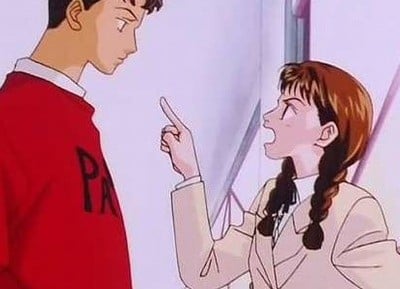
Traditional wisdom for romance fiction says that girls love dangerous guys, so series like Boys Over Flowers are filled with different varieties of jerk-face. Every guy in the F4 is cruel in his own way (including Rui), with the worst going so far as threatening sexual assault or even having other boys threaten this, just to bend our heroine Makino to their whims. The supposed appeal is all in the forbidden fruit aspect of loving a man you know is dangerous and maybe being able to "tame" him. Ouran's popularity proved that maybe that's not what a lot of shojo readers want after all. Maybe they might want boys who act more like them (or act like puppies, in some cases). If that's the fantasy, why not go full fantasy? Why give the boy all those hazardous edges when he could just be a sweetheart who enjoys catering to you?
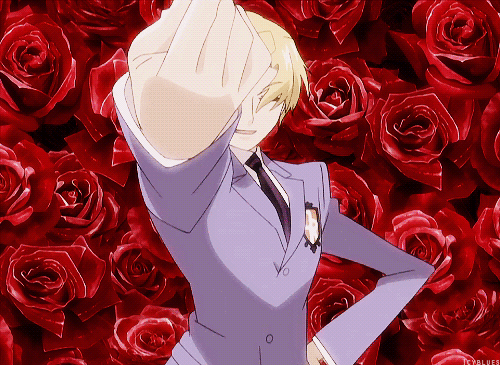
The fujoshi shows that have followed in Ouran's wake continued to fill their casts with cuddly boy-band personas. It says a lot about how far these series have come when the "bad boy" in your cast is someone like Rin Matsuoka, who can be mean to his friends at first, but spends all his time obsessing over swimming, being protective of his sister, and hiding the biggest and softest heart in the group. Maybe girls—or at least the ones currently buying up figures of cute anime boys—prefer approachable to edgy after all.
Heroines are Different
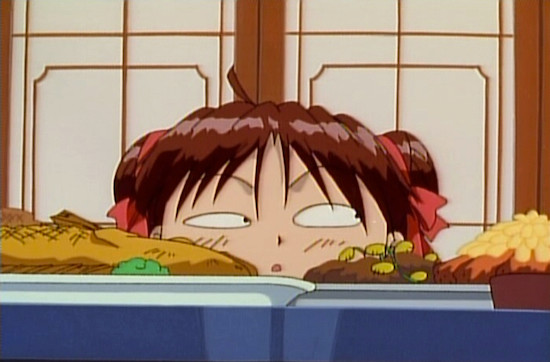
Reverse harem heroines are not unlike their male counterparts. They're intended to be everygirls, stand-ins for the female audience, and therefore as average as possible. They're not particularly good students, they've got lots of goofy but endearing flaws, and they're usually pretty helpless so the boys can save them. Of course, the boys think they're perfect and love them anyway. It's the same thing we see in American YA and romance novels, and it gets pretty old over time, especially when these stories focus so much narrative energy on these incredibly generic girls. It's hard to imagine why all the boys in Fushigi Yuugi fall head over heels for Miaka, a silly middle-schooler whose main personality trait is a huge appetite. Even more so, I don't get why I should care about her compared to the more interesting supporting characters.
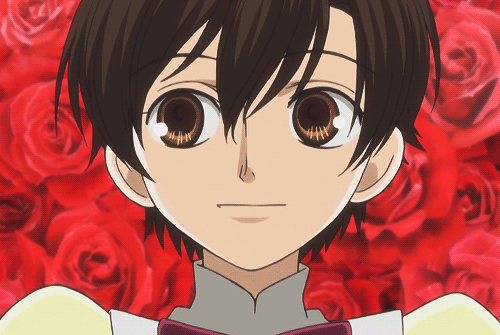
One of the freshest elements of Ouran was its protagonist, Haruhi Fujioka. Pieces of her can be found in earlier shojo heroines, like Tohru Honda's (Fruits Basket) strong empathy and ability to break down people's walls regardless of romantic attraction, or Makino's (Boys Over Flowers) strong-willed, take-no-crap attitude. However, these traits are combined in Haruhi to an extent that feels more relatable and more admirable. Girls can relate both to her sarcastic attitude toward the Host Club, and strive to be as understanding as she is toward her friends. This change is especially important in terms of Haruhi's harsher side. Unlike Makino, she's not a tsundere whose defenses are just obstacles and challenges for the boys. Her outspoken stubbornness is a core part of who she is, and the guys of the Host Club love her for that. Her sharp intellect, ability to speak her mind, and firm grounding in reality keep them on their toes. That's still not even the tip of the iceberg with Haruhi, whose blasé approach to gender roles can be just as appealing as her sarcasm or hidden sweetness. Haruhi is a well-written, fully-realized character—a rarity in the genre both before and after Ouran, but it's become less rare as time passes. Just in this past year, we've seen at least two more traditional shojo romances with strong heroines: Yona of the Dawn and Snow White with the Red Hair.
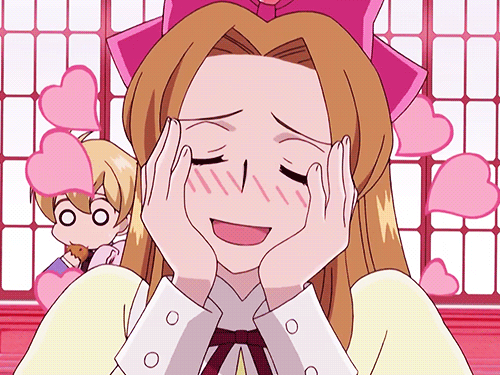
However, when it comes to fujoshi comedies, Haruhi may not be the most influential part of Ouran. That would be Renge Houshakuji, the Host Club's "manager." Renge is a huge otaku who joins because Kyoya resembles her husbando from an otome game. She proceeds to squeal over every moment of "moe" behavior between the boys in the club, hatching schemes to broaden their "appeal" to female classmates. Renge may be a goofy exaggeration, but she was more of a stand-in for Ouran's audience than Haruhi, and viewers came to find more fujoshi characters endearing thanks to the show's gentle approval of her madness. Characters like Free!'s Gou owe their existence to her, able to gape and squeal at the muscles and homoeroticism around her without shame.
Still, The Focus is On the Boys

Ouran is also distinct from most previous shojo for focusing more on the boys' lives around the girl (who also has her own life), rather than just the heroine herself and how they feel about her. Fushigi Yuugi and Boys Over Flowers are fundamentally Miaka's and Makino's stories of love. The guys are important, but the narrative focus remains on the female protagonists, and we rarely spend any time away from them. Haruhi is an important presence who ties the club together, but the character drama is as much about the boys' relationships with each other as their relationships with her, sometimes spending entire episodes away from Haruhi. Tamaki also has the ability to blow past people's defenses and draw out their true selves, so flashback episodes reveal how this endeared him to the twins and Kyoya. The point is that the Host Club on the whole is a family, and every part of it is important.
Ouran High School Host Club also loves to parody the familiar "types" of reverse harem storylines. It sets characters up as the "cool type" or "prince type," only to later break them down with more complex backstories that reveal what their personas are hiding. In a strange sort of way, Ouran has made this an expectation for fujoshi comedies, where having just one classic "type" of personality is never enough to make a complete character. Shows like Free! and Uta no Prince Sama offer unexpected little variations on standard character types (like smart guy Rei's goofy freakouts or the effeminate Natsuki's harsh split personality), so they still feel fresh.
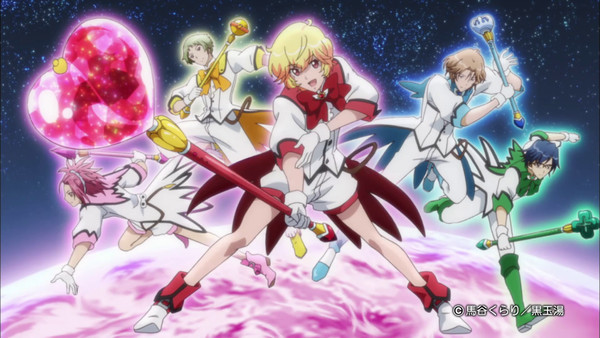
The unintended consequence of this is the realization that girls don't really need to see a supposed example of themselves in these shows at all. (This makes them more similar to the otaku market than expected, which has been gobbling up moe shows with female-only casts for years.) Girls just want their boys to be sufficiently complicated and come in a variety of flavors. It's strange that this appeal would spring from a series like Ouran High School Host Club, with its strong and memorable heroine. But there's no doubt that the genre Ouran pioneered has shown a gradually shrinking female presence: from girls who are mere cheerleaders to the main plot like Gou, to shows like Cute High Earth Defense Club LOVE! where there are no girls at all. This necessitates the further split of fujoshi shows from shojo. Even if both genres are losing the more glaringly sexist trappings of years past, one is doing it with stronger female characters and the other is doing it without any female characters at all.
Self-Awareness and Camp are King
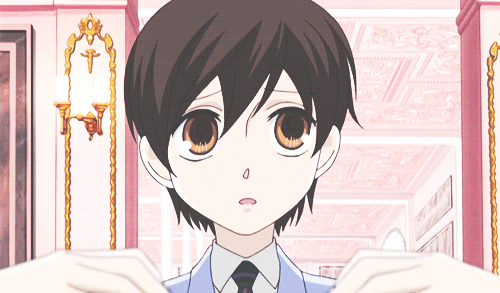
At the end of the day, one thing explains these shows' appeal above all else: self-awareness. These shows put all their cards on the table, letting fans know that they're in on the joke so viewers can laugh at themselves a little, while indulging at the same time. Ouran was constantly breaking the fourth wall, skewering different shojo tropes with surprising affection. One of the sillier examples of Ouran's approach to "types" came with Mori, the club's supposed "wild type" for being imposing, tall, and stoic. He'd be the "dangerous guy" in any other reverse harem, but Mori is just a giant teddy bear who spends all his time babysitting his childlike cousin and fellow host, Honey. Two episodes revolve around another tough-looking guy trying to learn Mori's secret, so his fellow bros will realize he's just a nice guy too.

Cute High Earth Defense Club LOVE! takes things in the opposite direction: limiting the guys to incredibly simple types and stretching its premise to a ridiculous degree. Rather than breaking the 4th wall occasionally, the show has no walls whatsoever, and broadcasts its nature as a comical celebration of manservice without pretense. Shows like Free! that never break the fourth wall have to be more subtle about their self-awareness, but that style of humor is still key to the series' appeal. It wouldn't be nearly as much fun to watch without its shameless female gaze. Camp is the key to everything.
Even Ouran's meaner jokes go down easily because it never takes itself too seriously. By the same token, Free!'s pandering camera angles and wink-nudge homoeroticism feel inviting and fun, instead of sleazy or exploitative. One of the biggest stumbling blocks I have with series like Boys Over Flowers is the feeling that I'm supposed to find these abusive relationship dynamics and traditional gender roles as appealing as the characters do. With a good dose of self-awareness, viewers can rest assured that they aren't necessarily supposed to take everything to heart. That doesn't forgive tasteless missteps, of course, so these series still have a responsibility to understand their own tone, which is a process that's only improving with time.
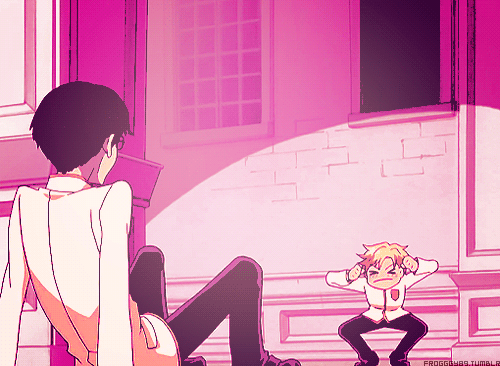
Fujoshi comedies are now so popular that they become more diverse with each new show. There's the tongue-in-cheek manservice of Free! or Uta no Prince Sama, but there are also more raunchy, zany comedies like Gugure! Kokkuri-san or Daily Lives of High School Boys. As the genre increasingly charts its own path, it's easy to forget how it all started: not with shonen-ai at all, but with a series poking fun at shojo romance that spoke to a surprising new audience. Since it's now officially nine years old, younger Free! fans might not have even seen Ouran High School Host Club! I still highly recommend it. Many landmark series lose their luster with age as their imitators gain more attention, but Ouran is still one of a kind. It's still clever and heartfelt enough to pull in new fans in 2015. Truth be told, I saw it for the first time last year! So let the Host Club invite you into their charmed fantasy world, and you'll never forget the experience.
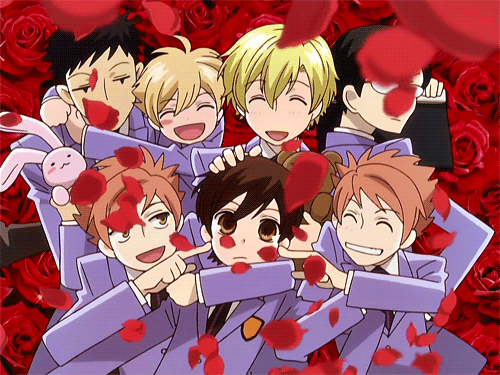
For those who have seen Ouran before, how did it change your world as an anime fan? Let us know in the forums!
discuss this in the forum (58 posts) |